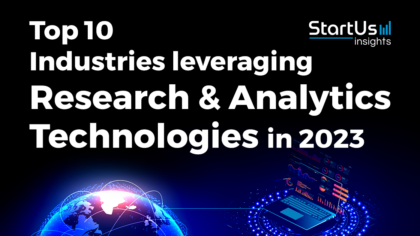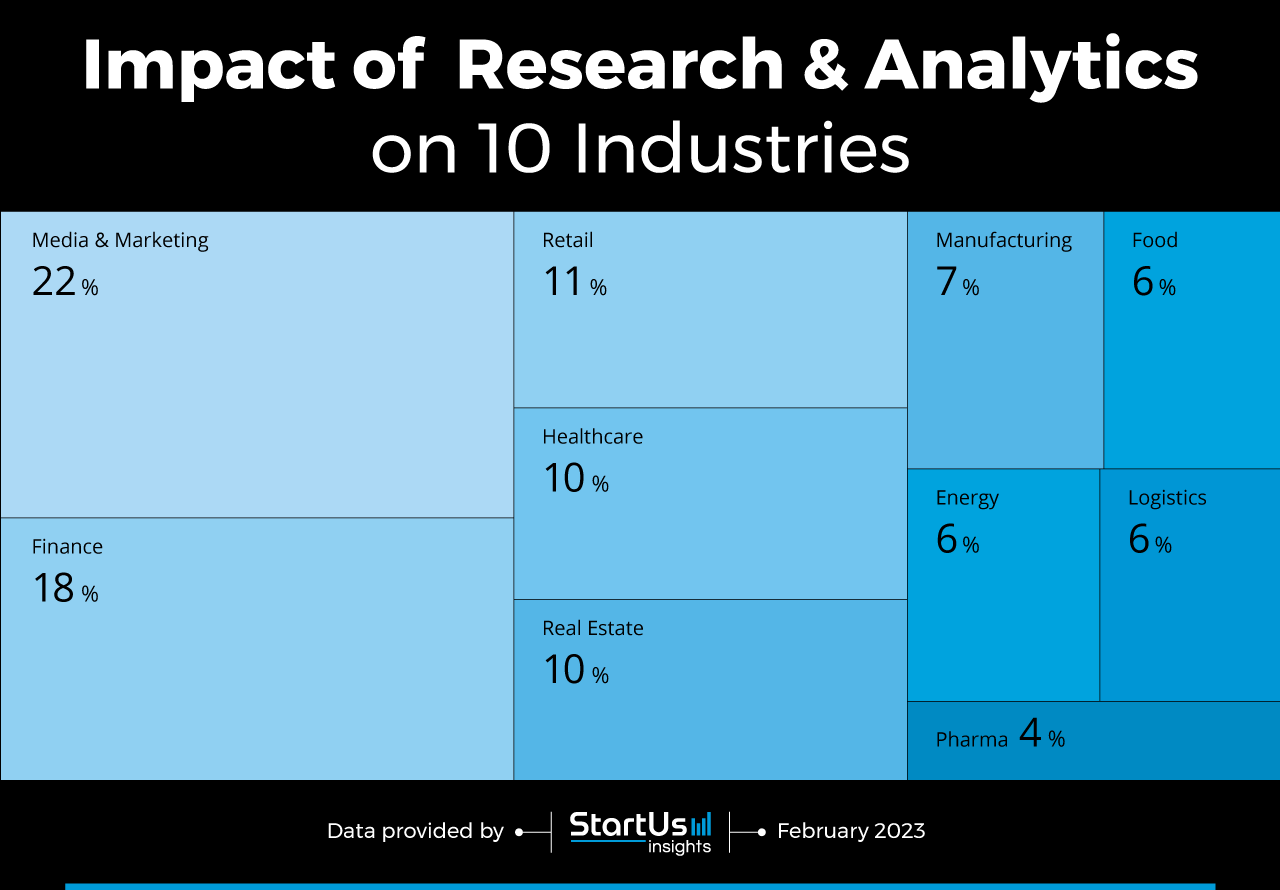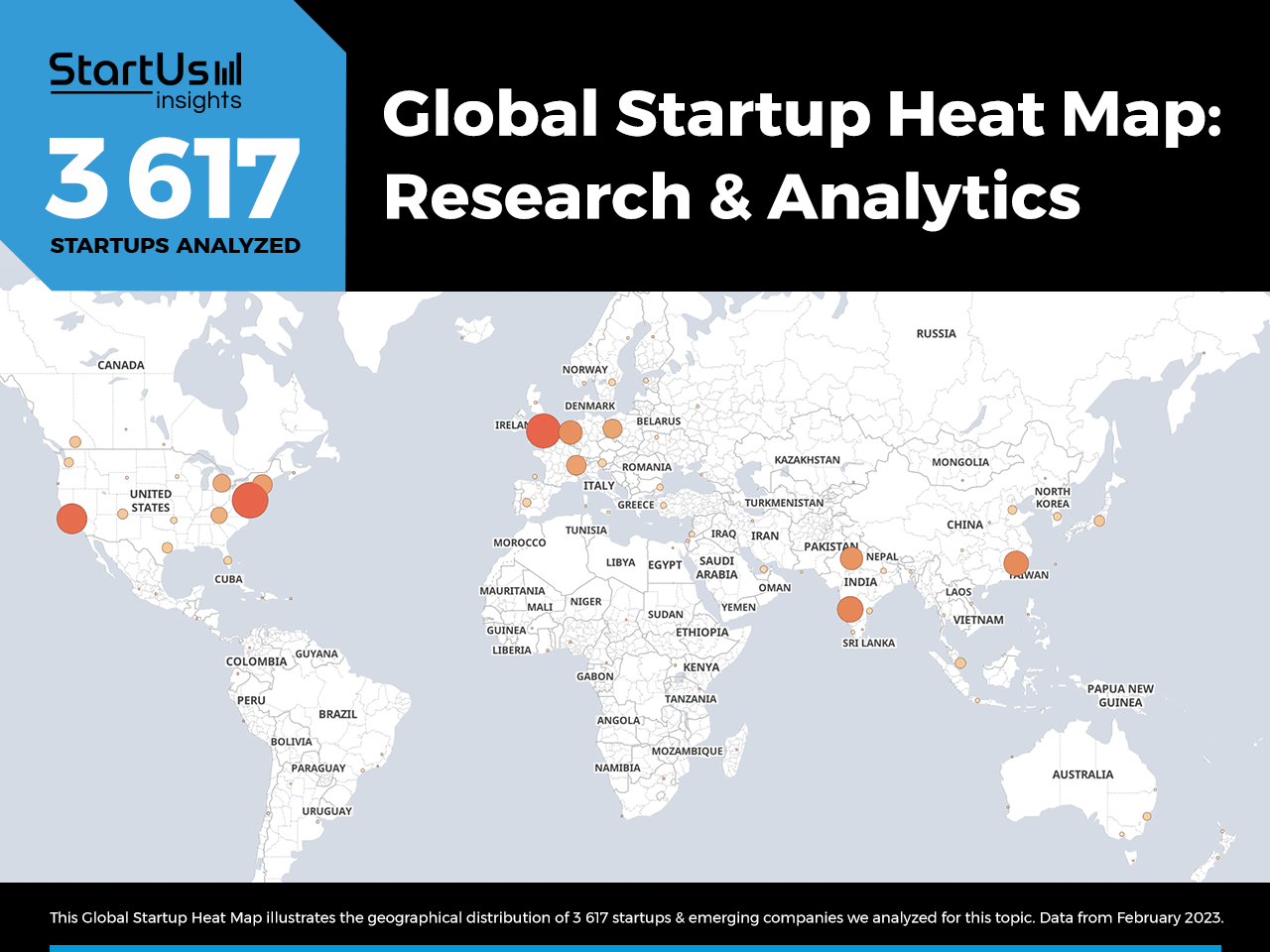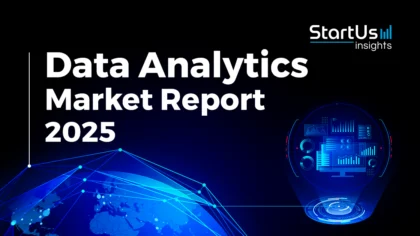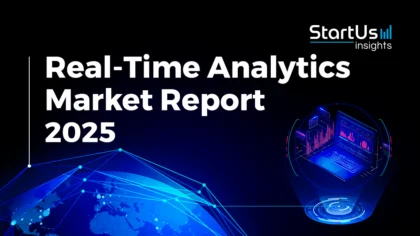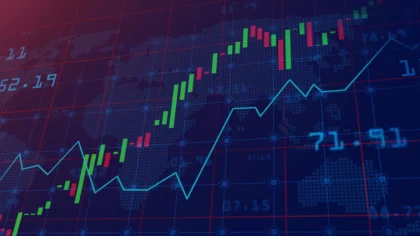Companies started gathering massive amounts of data after the mass digitization of business processes and operations. However, manual assessment of large datasets is time and cost-intensive, rendering the highly relevant data unusable. Novel data processing technologies like big data, analytics, and artificial intelligence (AI) tackle these issues. In this data-driven report, we give you innovation insights based on our analysis of 3617 research and analytics startups & technologies. They offer critical business and customer insights that enable data-driven decision-making in your organization. Read more to explore the top research and analytics examples impacting 10 industries and how they advance your business.
Tree Map reveals the Top Research and Analytics Examples across 10 Industries
The Tree Map below illustrates the examples of research and analytics technologies across 10 industries in 2023 and 2024. The media and marketing industries have easy access to customer data and thus leverage research and analytics solutions the most. Additionally, finance, food, and retail companies rely on customer behavioral insights to drive product innovations and ensure sales growth.
The bulk of data available for healthcare institutions allows them to utilize research and analytics to optimize administration and simplify patient management. At the same time, manufacturers, energy companies, and logistics providers use it to find operational inefficiencies and forecast market demands. Real estate firms benefit from research and analytics by personalizing service offerings whereas pharmaceuticals leverage it to create insights into consumer demand, drug efficacy, and more.
Global Startup Heat Map covers 3617 Research & Analytics Startups & Scaleups
The Global Startup Heat Map below highlights the global distribution of the 3617 exemplary startups & scaleups that we analyzed for this research. Created through the StartUs Insights Discovery Platform that covers 3 790 000+ startups & scaleups globally, the Heat Map reveals that the US has a high concentration of research & analytics startups, followed by Western Europe.
Below, you get to meet 10 out of these 3617 promising startups & scaleups as well as the solutions they develop. These research & analytics startups are hand-picked based on criteria such as founding year, location, funding raised, & more. Depending on your specific needs, your top picks might look entirely different.
Top Applications of Research and Analytics across 10 Industries (2023 & 2024)
1. Media & Marketing
Transitioning to digital media provide media and marketing companies with user-specific information. With big data and AI, startups develop solutions that analyze this data to identify customer preferences and better target content and ads. Moreover, social media platforms like Instagram and Meta come with research and analytics tools that enable marketers to refine marketing campaigns. This enables media companies and marketers to deliver content to a global audience.
Further, forecasting social media trends using research and analytics platform allows them to identify business opportunities. These solutions empower them to create more effective campaigns for their clients, improving customer satisfaction and profits.
Plus Media Solutions offers an Impact Management System
Plus Media Solutions is a US-based startup that develops +Impact Hub, an impact management system. It allows businesses and marketers to curate social and environmental solutions for creating content strategies. They share the content and +Impact Hub provides audience analytics based on their engagement with the content. This allows companies with ethically sourced and sustainable products to boost sales, increase business exposure, and drive awareness.
2. Finance
Financial research is a common process across all financial sectors like fund management, loan processing, customer onboarding, etc. Manually doing these tasks is prone to errors and consumes a lot of time. That is why startups create research and analytics platforms that automate customer and business data analysis.
For example, banks and non-banking financial companies (NBFCs) now utilize credit scoring platforms to assess the creditworthiness of customers. Further, research and analytics improve risk management, investment decisions, product development, service personalization, and more in the financial sector. These data-driven processes enable banks and NBFCs to better understand customer profiles and preferences to improve their experience while increasing sales.
ResultElf makes a Credit Optimization Platform
ResultElf is a Finnish startup that creates Cresso, a credit optimization platform. It offers credit decision-as-a-service and combines mathematical optimization theory and cloud computing to optimize loan offers. Based on existing risk estimation models, Cresso also recommends more accurate estimates and predicts payback times. Digital banks and lenders use it to find optimal loan amounts and interest rates, quantify risks, and minimize the usage of expensive external data.
3. Retail
Similar to fintech companies, retail businesses need accurate market and demand forecasts to streamline inventory and product development. Therefore, research and analytics solutions greatly benefit retail companies. Such solutions collect and process in-store and eCommerce customer and business data. This provides insights into customer buying patterns and specific product performance.
Consequently, these data-driven insights allow retail businesses to personalize customer experiences across various sales channels. Social media further enable retailers to collect customer-specific information that is crucial to driving new product development.
Saledock delivers Real-Time Point of Sale (POS) & eCommerce Analytics
Saledock is a UK-based startup that offers real-time POS and eCommerce analytics. The startup’s solution unifies in-store and online sales channels to track sales, inventory, as well as product and staff performance. It then offers data-driven insights to identify emerging trends, high-performing partners, peak hours, and more. This allows retailers to quickly eliminate operational inefficiencies and streamline inventory planning, boosting sales.
4. Healthcare
The healthcare sector deals with large amounts of the patient, hospital, distributor, and supplier data across the value chain. Research and analytics solutions collect these diverse datasets, clean them, and apply AI or ML to derive business insights. This improves staff allocation, treatment management, inventory planning, supply chain management, and more.
Moreover, the integration of telemedicine and healthcare wearables simplifies patient monitoring. This data allows healthcare institutions to quickly identify pandemics and prevent disease spread. Analytics solutions also function as decision support systems (DSS) by analyzing medical images for disease diagnosis, eliminating misdiagnosis.
Simbox enables Smart Capacity Management
Simbox is a Dutch startup that develops Forecaster, a smart capacity management solution. It is a forecasting engine that uses self-learning prediction and simulation models to predict patient flow accurately for up to 14 days. Forecaster also integrates with hospital databases to retrieve relevant information. Further, it forecasts confidence intervals, emergency arrivals, and patients to be transferred. This allows hospital administrators to manage patient and staff allocation better, ensuring efficient care delivery.
5. Real Estate
Real estate developers and investors are able to utilize both public and private data sources to analyze market trends and pricing details. However, many such data platforms require additional product integrations to identify marketing or buying opportunities. To aid this, startups provide plug-and-play research and analytics software that integrates with existing systems. This way, real estate businesses avoid in-house product development while being able to identify hyperlocal patterns quickly and streamline investment decisions.
Moreover, analyzing customer data enables companies to identify their preferences and provide personalized discounts, increasing conversion. Lastly, research and analytics enable automated property valuation models, price forecasting, and cluster analysis, among others.
UrbanDataLab simplifies Real Estate Return Modeling
UrbanDataLab is a Swiss startup that offers predictive real-estate-return models. The startup’s suite of tools allows firms to define spatial strategies and generate site reports for areas of interest. It also enables real estate and property management companies to map population demographics into location data. Consequently, the startup’s tools aid location market analysis and geo-marketing.

6. Manufacturing
The manufacturing sector leverages research and analytics through massive datasets created by process digitization and industrial automation. Data acquisition and control units, such as SCADA, the internet of things (IoT), and manufacturing execution systems (MES), offer highly relevant operational data.
With research and analytics, manufacturers are able to convert this data into data-driven insights for production optimization, fault prediction, preventive maintenance, and more. On the other hand, external data like customer preferences and market demands allow them to streamline inventory and production planning. Consequently, manufacturers are able to shift to more effective lean or just-in-time (JIT) manufacturing workflows.
Pulse Analytics provides Manufacturing Business Intelligence (BI)
Pulse Analytics is an Australian startup that offers manufacturing business intelligence. The startup’s solution captures data from enterprise resource planning (ERP) systems, sensors, and other software. It then utilizes analytics and visualization to deliver insights on custom-built dashboards and ensure a single source of truth. This enables managers to mitigate data silos and improve operational transparency. In effect, Pulse Analytics’ BI solution enables data-driven decision-making and real-time operational analytics as well as optimizes business performance.
7. Food
For customer-facing food businesses like restaurant chains and food retailers, research and analytics provide market trends and customer preferences. With this data, they are able to better market their products and streamline product offerings. Additionally, the same data enables food brands to direct new product development to address the dynamic market demands.
Further, research and analytics in food processing and manufacturing improve production quality and throughput by finding operational inefficiencies. For instance, predictive statistical process control allows food and beverage businesses to streamline production parameters as deviations occur. Research and analytics also enable accurate prediction of food product shelf-life, prevention of food fraud by fingerprinting, and more.
Brizo FoodMetrics offers Food Service Market Analytics
Brizo FoodMetrics is a Canadian startup that makes a food service market analytics platform. It combines big data, analytics, and AI to analyze various food service and restaurant data points like local menu items, reviews, and food technology providers. This allows restaurants and other food chains to target sales-ready leads and monitor customers and competitors in real-time. The platform also enriches existing customer relationship management (CRM) and BI tools with high-quality leads.
8. Energy
Electric grids need to accommodate more and more devices every year and ensure a seamless shift to renewables. Asset and energy consumption monitoring are thus crucial for energy companies to achieve these goals. To aid them, startups develop research and analytics solutions that identify energy consumption patterns and improve power flow control for renewables. This, in turn, allows energy producers and distributors to quickly identify energy thefts and predict grid outages.
Further, connected grids, renewable energy generation systems, energy storage systems (ESSs), and electric vehicles (EVs) form self-regulating power infrastructures. Research and analytics streamline their interactions to improve demand-side management and avoid outages. Energy analytics based on connected meters also enable them to incentivize responsible customers and improve their experience.
Euclidz Technologies facilitates Demand Response Management
Euclidz Technologies is a UAE-based startup that develops intelligent solutions for demand response management, failure risk modeling, and more. The startup uses predictive analytics and cloud computing to forecast consumption patterns and improve demand-side management, among others.
For example, Euclidz Technologies leverages self-learning algorithms to analyze historic consumption and smart meter data and predict grid outages to minimize downtimes. Similarly, the startup enables energy and utility companies to optimize operations and reduce energy and capital loss.
9. Logistics
Market research and business analytics increase operational visibility and offer accurate market predictions for logistics companies. This data allows them to optimize material and product movement as well as mitigate transit delays. Moreover, insights into delivery fleets and sourcing partners enable logistics companies to improve business decisions.
For example, freight forwarders are able to analyze different operational parameters, including costs and delivery performance, of various logistics partners. This ensures that freight forwarding companies partner with businesses that offer optimal logistics services based on costs. Similarly, research and analytics solutions improve warehouse management, streamline last-mile deliveries, estimate future bottlenecks, and more.
Leaf Logistics improves Logistics Network Capacity Management
Leaf Logistics is a US-based startup that builds a transportation network to increase network capacity. The startup connects shippers, carriers, and brokers through its platform to reveal unused resources. Additionally, the platform uses machine learning to improve transportation planning and execution. This enhances the efficiency of logistics networks while reducing costs and CO2 emissions by minimizing empty miles.
10. Pharma
While pharma companies primarily leverage big data and analytics to advance drug discovery and development, research and analytics aid business operations as well. For example, pharma business intelligence allows them to analyze patient trends to discover emerging markets and sales rep performance to improve capital and resource allocation.
harma companies further utilize research and analytics solutions to reduce production costs by optimizing key metrics like ingredient cost per prescription. Additionally, they find use in personalized medicine development, marketing campaigns, and clinical trials.
3Analytics delivers Drug Safety Analytics
3Analytics is an Indian startup that creates an AI-based drug safety analytics and compliance automation platform. It aggregates and contextualizes patient-specific data from multiple sources and utilizes AI to discover patterns and trends. This allows pharma companies to promptly identify adverse drug reaction (ADR) risks and prevent casualties. 3Analytics’ pharmacovigilance platform thus improves the safety of drugs and vaccines.
Discover All Research & Analytics Startups
Research and analytics are crucial for businesses to enable data-driven workflows. IoT, open data platforms, cloud computing, and high-performance computing (HPC) will increase the efficiency of such solutions. Moreover, they allow companies to improve the sustainability of operations and align with ESG goals while optimizing costs. Get in touch to identify specific research and analytics startups & solutions that advance your business!
